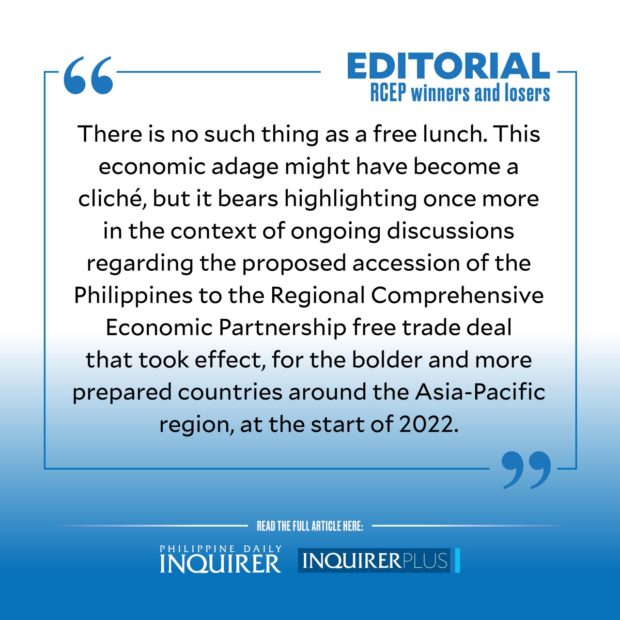RCEP winners and losers
There is no such thing as a free lunch. This economic adage might have become a cliché, but it bears highlighting once more in the context of ongoing discussions regarding the proposed accession of the Philippines to the Regional Comprehensive Economic Partnership (RCEP) free trade deal that took effect, for the bolder and more prepared countries around the Asia-Pacific region, at the start of 2022.
The Senate, whose approval is required for all international treaties the country enters into, has deferred ratification of the deal that will potentially see the Philippines join an economic trading bloc that encompasses one-third of the world’s population, one-third of the global economic output, one-third of potential global foreign direct investment inflows, and up to a quarter of all international trade in goods and services.
This delay could have more to do with domestic politics rather than international economics. The country is in the middle of its triennial election season where half of the Senate’s seats are up for grabs and several incumbent senators are gunning for re-elections.
Approving an international trade deal that could potentially see thousands of local jobs lost due to the influx of foreign goods is the kind of political suicide that no seasoned politician wants in an election season. So the approval of the country’s membership in this free trade deal is something that is left to the new set of leaders who will be elected next month and take office at the start of the second half of the year.
This delay is something that policymakers in both the public and private sectors should make good use of.
The problem with free trade agreements in the local context is that their advocates tend to highlight only the benefits they would bring, while simultaneously downplaying their ill effects. Their proponents have always tried to win over the public by promising cheaper consumer goods, while conveniently forgetting the economic law that such a benefit will have to be paid for one way or another.
Though not a free trade deal, per se, the latest example of this reality is the rice tariffication law that made it easier and cheaper to import rice from overseas to address the periodic local production shortfalls, but has resulted in greater hardship for local rice farmers. While solving one problem, policymakers have created another one.
There is no escaping this reality of modern economics, just as no one can defy the laws of physics where one action begets an opposite reaction. Yet, these reactions can be mitigated and, with the right policies, be fruitfully harnessed to create better outcomes.
By highlighting only the good effects of liberalized trade, policymakers paint a misleading picture of a rosy future, ignoring the reality that cheaper goods and services from overseas will result in lost jobs locally.
In the meantime, thanks to the free trade deal, the bulk of Filipinos will be able to buy cheaper agricultural produce and buy better quality products from overseas while leaving our less fortunate countrymen, already living on the fringes of society, farther out into the economic margins.
The country is a big exporter of goods like electronic components and services like manpower, as well as a big importer of the raw materials necessary to power our economic growth. Make no mistake about it: That the Philippines will join RCEP is not a question of “if” but “when.” Giving in to the temptations of protectionism will be a shortsighted move.
But as sure as there will be winners, there will be losers. And addressing this economic reality is what policymakers should focus on during this delay in the country’s RCEP membership.
For one, instead of trying to win over more Filipinos by highlighting the good, policymakers should help our citizens prepare for the inevitable by giving them a complete picture of winners and losers in this free trade deal. This will allow the government to focus its efforts, not just on promoting winning industries but also mitigating the effects on the losing ones through support mechanisms, safety nets and, if necessary, retooling for those whose futures look bleak. This will allow those on the losing end to prepare for the worse and take appropriate measures before they are overwhelmed by a total wave of cheaper imports.
Indeed, there is no such thing as a free lunch. But our proverbial lunch has been delayed, and we should use this time of waiting wisely to prepare for eventually and inevitably paying for our meal.






















